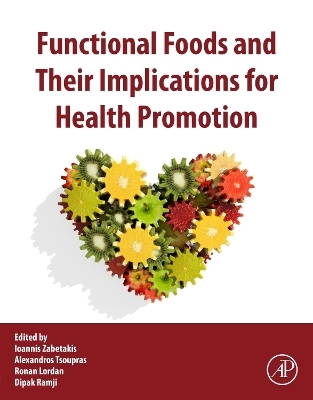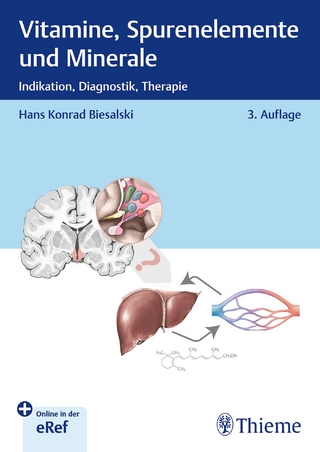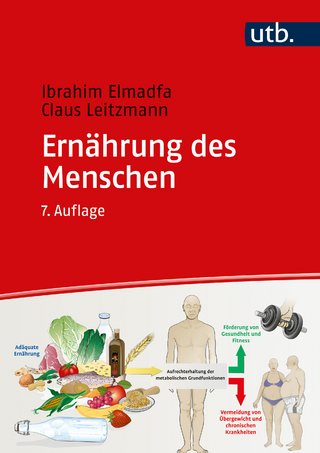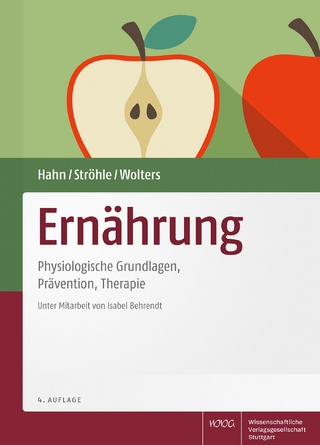
Functional Foods and their Implications for Health Promotion
Academic Press Inc (Verlag)
978-0-12-823811-0 (ISBN)
Intended for nutritionists, dieticians, food technologists, as well as students and researchers working in nutrition, dietetics, and food science, this book is sure to be a welcomed resource.
Ioannis Zabetakis has studied and worked in Greece, United Kingdom and Ireland. Originally a chemist, he fell in love with food science (sensory and functional properties of food). After an academic career at the Universities of Leeds and Athens spanning 15 years, where he developed a strong interest in lipids and cardiovascular diseases, Ioannis joined the Department of Biological Sciences at the University of Limerick (UL) in Ireland. In UL, the ongoing focus of his work is on the cardioprotective properties of food lipids with a particular emphasis on dairy and marine foods. With >75 papers and two patents, his quest is toward a healthier diet and lifestyle that will render us less dependent on medicines. http://scieng.ul.ie/departments/life-sciences/people/dr-ioannis-zabetakis Twitter Handle: @yanzabet Ronan Lordan carried out his undergraduate studies at the University of Limerick, graduating with a first-class honors Bachelor of Science degree in Biological Sciences and Education in 2015. Ronan taught Leaving Certificate Biology and Chemistry in Irish second-level schools before returning to the University of Limerick in 2016 to begin his PhD scholarship to study the role of dietary polar lipids in inflammation and cardiovascular disease. Ronan has lectured on various topics including lipids chemistry, genetics, and health. Ronan has published several peer-reviewed papers. His research interests include: (a) elucidating the structures of bioactive polar lipids in various foods; (b) developing novel functional foods and nutraceuticals against cardiovascular disease; and (c) discerning the mechanisms of platelet-activating factor-induced systemic inflammation. Ronan is the process of completing his PhD. Twitter Handle: @el_ronan Dr Alexandros Tsoupras studied Chemistry-Biochemistry (BSc, MSc and PhD; Department of Chemistry, National and Kapodistrian University of Athens, Greece), with scholarships, where he also worked as a Postgraduate-Postdoctoral Research-Teaching Associate, and then at the "Albany Medical College" (NY, USA). Alexandros was also a Lecturer in Greek Colleges, a Public Servant-Scientist, and then a Post-Doctoral Research-Teaching Associate at the University of Limerick (Department of Biological Sciences), Ireland, where he was promoted as an Assistant Professor, while since 2023 he is an Assistant Professor at the Democritus University of Thrace (Department of Chemistry, Kavala, Greece). He studies the implications of thrombo-inflammation and oxidative stress in chronic diseases, as well as the anti-inflammatory and antioxidant properties of several natural bioactives and/or synthetic compounds, as ingredients for functional foods, cosmetics and/or drugs with health promoting effects, with participations in more than 80 scientific publications (2500 references, h-index=24, Scopus), in Scientific Conferences and patents-inventions Dipak Ramji is Professor of Cardiovascular Science at the School of Biosciences in Cardiff University. He received his BSc (Hons) degree (Biochemistry) and his PhD (Molecular Biology) from the University of Leeds. This was followed by post-doctoral research at the European Molecular Biology Laboratory (Heidelberg) and the Istituto di Ricerche di Biologia Molecolare P. Angeletti (Rome) with fellowships from the Royal Society and the EU. His research is focused on understanding how natural products regulate cellular processes in heart disease with the goal of attaining deeper mechanistic insight and identifying preventative/therapeutic agents. He has published over 150 research articles and is an Editorial Board member of 16 international journals; regular organizing committee member, speaker and track/session chair at international conferences on heart disease; involved in grant evaluation for over 20 organizations; and supervised over 25 PhD students.
Part I. Plant derived functional foods
1. Fruitflow (tomato concentrate) (CVDs)
2. Coffee (Inflammation, CVDs)
3. Cocoa (Inflammation, CVDs)
4. Olive oil (CVDs, Inflammation)
5. Pomaces (grape, apple, olive) (Oxidation, Inflammation)
6. Berries(Oxidation, inflammation)
Part II. Dairy foods
7. Yoghurt and probiotics (CVDs, obesity, diabetes)
8. Cheese (CVDs)
9. Probiotics drinks (CVDs, obesity, diabetes)
Part III. Marine food
10. Seafood (Inflammation)
11. Fish (CVDs, Inflammation)
Part IV. Beverages
12. Beer (Inflammation)
13. Wine (Inflammation, CVDs)
14. Legislation on Functional foods and Legislation on Health Claims
| Erscheinungsdatum | 31.10.2022 |
|---|---|
| Verlagsort | San Diego |
| Sprache | englisch |
| Maße | 216 x 276 mm |
| Gewicht | 450 g |
| Themenwelt | Medizin / Pharmazie ► Gesundheitsfachberufe ► Diätassistenz / Ernährungsberatung |
| Technik ► Lebensmitteltechnologie | |
| ISBN-10 | 0-12-823811-9 / 0128238119 |
| ISBN-13 | 978-0-12-823811-0 / 9780128238110 |
| Zustand | Neuware |
| Haben Sie eine Frage zum Produkt? |
aus dem Bereich


